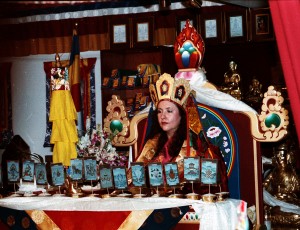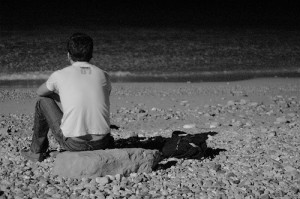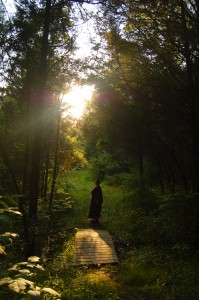There are three different levels on which you can recognize your Teacher. One is an extremely poor level, a common, ordinary level. One is an intermediate level in which you see that the teacher holds the teachings purely and gives the teachings purely and you really admire the Teacher and feel great respect for the Teacher. That, however, is only an intermediate level of recognition.
The deepest and supreme level of recognition is recognizing the Teacher not as a person, but rather, as a door to liberation, as one’s own nature. This supreme level recognizes the Teacher as one’s mind, recognizes the Teacher as the miraculous intention of the Buddha, appearing in a manifest way in order to benefit beings. It recognizes the Teacher as that original longing, the longing to know that nature, to recognize the Teacher as the answer, to recognize the Teacher and primordial wisdom itself in some incarnate form, in the same way that your own relationship to the path becomes not an ordinary thing, but a very profound and mystical thing, a thing of truth, a thing able to bring about awakening.
The relationship with the Teacher is especially difficult for Westerners. We have lots of training on authority figures, we have lots of training on mothers and fathers, but we have no training on to how to deal with this longing. The way we have dealt with it in the past has hurt us. It has brought us a great deal of pain and suffering. It has made us act in ways that we do not understand. We are people who had a particular karma and it did not quite fit in with the karma of the society in which we were brought up. If that were not so, then more of the society in which we were brought up would be able to approach the idea of awakening, would be able to approach the idea of having a Teacher in order to follow a supreme path in order to achieve the great awakening.
So, if we can reprogram ourselves by looking back at that original longing and understanding its depth, understanding the ways in which we compensated and forgiving ourselves and confessing the lack of recognition, we will then be able to establish a relationship with the Teacher, the path, the Buddha and with the meditational deities that we practice. If we can establish that relationship anew in that way, the quality of the path that we practice will be completely different. The quality of the experience that we have will be completely different. We will feel healed, and the need for that healing is very sharp and very strong.
It’s my job to watch over my students. Some of you spend 75 percent of your energy blaming yourself for the way you are. Some of you spend a lot of energy trying to act out things that will never bear fruit concerning the Dharma and concerning your Teacher. Some of you spend 75 percent of your energy trying to pretend that you don’t feel or trying to take issue with one thing or another so you don’t have to feel that longing.
I look at you and I have a sense of how you’re managing that longing. It’s like you come so far and you’re right here, almost to my heart, and then you turn away. Some of you stand in the background and look from afar, look hungry, peek out from behind the door, close the door again, stand back there and be hungry for some more. Then you open the door and do like that. Each one of you has a particular and peculiar different way that you deal with this, but you are all living with this.
You were born with the longing to awaken. You were born with a longing to know your own nature, to taste that nature. You were born with a longing and a homing instinct to find your Teacher. You were born with a longing to find a pure path and there were no words like that when you grew up.
You compensated by substituting other things and trying to make them the object of your longing. You made lots of mistakes because of it. That’s not the point, though. There is nothing you can do in one lifetime that is as meaningful a miscalculation as simply reaching for that nature and trying to find it in something small. That is the biggest miscalculation that any of us can make and we do it constantly. That’s what keeps us revolving endlessly in cyclic existence.
An excerpt from a teaching by Jetsunma Ahkon Lhamo called “Longing for the Guru”
Copyright © Jetsunma Ahkon Lhamo. All rights reserved





